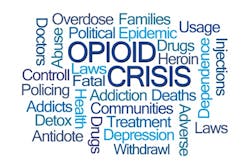In 2018, Healthcare Innovation interviewed members of a working group with the Patient-Centered Clinical Decision Support (PCCDS) Learning Network about the development of a roadmap to deliver CDS interventions that improve pain management and opioid use outcomes for 2 million patients by 2021. On March 28, they released their stakeholder-driven action plan.
The results are a set of recommended actions that stakeholders can employ to improve care delivery and reduce inappropriate opioid use and abuse. The action plan outlines 19 PCCDS tools and five detailed patient scenarios that explore the ways in which PCCDS can support better care delivery and outcomes to prevent or intervene with opioid use disorder (OUD).
The recommended tools include topic-specific, evidence-based information about medical conditions, a pre-visit questionnaire, an OUD assessment tool, online patient portals and a decision tool for helping patients and providers decide if opioid medications are the right option for them.
The report also proposed 11 areas of recommended actions ranging from fostering best practices and collaboration among association members to leveraging available funding to support providers in procuring and implementing PCCDS tools and workflows. Of the recommended actions developed from this process, one significant measure would be to leverage state Medicaid agency chief medical officer connections to create measurement efforts to track progress and support further infrastructure development. States also can leverage federal funding to apply health IT to address the opioid crisis.
The working group was co-chaired by consultant Jerry Osheroff, M.D., and Barry Blumenfeld, M.D., a senior physician informaticist at RTI International.
Although many of the interventions the working group describes exist in some provider organizations, few are widespread yet, Blumenfeld told Healthcare Innovation last year. “The current state is rapidly changing and is pretty nascent,” he added. The CDC published guidelines for opioids and pain management two years ago and those are just beginning to filter out as actual CDS artifacts from organizations such as ONC and CDS Connect. “There are isolated islands of activity at the moment, and I think many people are hoping for that to change quite quickly,” he noted, adding that Congress recently passed an opioid bill that has health IT components to it.
“We want to see these future scenarios and PCCDS interventions widely and successfully implemented,” Osheroff said in that interview. Patient involvement in decision making is central to the effort. “The raison d’etre of the Learning Network is working toward a world where clinicians and patients are working together on shared care plans and shared decision making.”
The working group was initially comprised of 15 people from an array of public and private stakeholder groups and organizations, including patient advocates, care delivery organizations, opioid guideline developers and others. As they worked, the group grew into a team of over 50 people.


